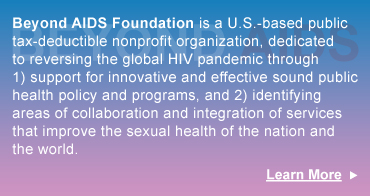This story puts our mission in a very clear perspective.
HIV increasingly infects black women in S.C. The (Columbia) State
By KATHRYN WINIARSKI
COLUMBIA, S.C. (AP) _ It began as a highly ordinary August day, but took a terrible, life-changing turn. Ten years later, Stephanie Williams has not forgotten the details of how she learned she was infected with HIV. Williams had left her job as a caregiver for the mentally retarded. She drove to pick up her son from day care. As she began to plan dinner, her boyfriend Darnell's mother stopped by with a confusing message. ``She came and said (Darnell) had to go with her,'' Williams said. ``The Health Department had requested that he go to their office.''Williams of Columbia would learn the following day that her boyfriend, with whom she had been having unprotected sex, had been given a test for HIV, the virus that causes AIDS. What Williams would not learn until a year later is that Darnell, who has since died from AIDS, tested positive. He didn't tell until Williams was diagnosed in 1991. ``He kept saying he was negative,'' Williams said. ``I wasn't concerned about HIV back then. I was in a monogamous relationship.''
Williams belongs to the fastest-growing group of HIV infected people in South Carolina: African-American women. Of all the women in the state living with HIV, 83 percent are black, and the majority are heterosexual. Though people with HIV and AIDS are living longer thanks to improved drug therapy, people of color have proven to be a particularly vulnerable to new infections. Blacks suffered HIV infection six times more often than whites in 1997 and were seven times more likely to get AIDS.
Reversing the trend will require an outpouring similar to what was seen last month among more than 40,000 African-Americans who rallied for removal of the Confederate flag from the State House dome, said state Rep. Joseph Neal, who represents Sumter and Richland counties. He spoke Thursday at Benedict College at one of many national town hall meetings on the HIV crisis among blacks, organized by the Congressional Black Caucus.
``I wonder where the anger is that ought to exist as we watch our children die,'' Neal said. ``Why is this not a political issue that causes us to come together and cry out?'' African-Americans lack the grass-roots rallying that existed among gay white males in the 1980s when they were most severely stricken by the disease. ``This is an evolving panepidemic in South Carolina in the African-American community,'' Neal said. ``I intend to make it an issue and keep it an issue.''Worldwide, approximately 47 million people have been infected by HIV and more than 13 million have died. In South Carolina, African-Americans are being harder-hit by HIV and AIDS than any other segment of society. Blacks here represent about 30 percent of the population, but account for about 77 percent of the 15,159 HIV and AIDS cases.
African-Americans are more likely to be poor and less likely to receive medical care and get an HIV test. As a result, they are diagnosed at a later stage and are more likely to continue spreading the disease and pass it to their offspring. Black heterosexual women say a blind trust in their partners continues to contribute to their high infection rate. That was the case for Pam McCree, a peer educator with Palmetto AIDS Life Support Services of Columbia, or PALSS. ``I was in a long-term relationship. I thought it couldn't happen to me,'' said McCree, who was shocked to be diagnosed in 1996. ``My friend didn't tell me (he had AIDS).
He's dead; that's how I found out.'' Williams, now 37, considered herself equally invulnerable. ``I might have had five (sexual) relationships in my life,'' said Williams, who is also a PALSS peer educator. ``I thought I wasn't in the category of people that could be infected.''
AP-ES-02-01-00 1402EST
Copyright (c) 2000 The Associated Press
Return to Archived Articles and Letters

